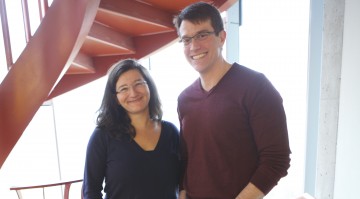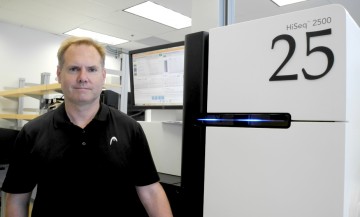Getting personal with cancer: using genome analysis to determine the best treatment for the individual

Dr. Janessa Laskin and Dr. Marco Marra
In 2008, Dr. Janessa Laskin, a clinical associate professor and medical oncologist at the BC Cancer Agency, delivered difficult, but all too common news to one of her patients. His rare form of tongue cancer had metastasized to his lungs and there was not much more that could be done to treat him.
Around the same time, scientists were beginning to make rapid advances in cancer treatment options; using DNA sequencing technologies to examine the composition of individual cancer genomes and to help deduce the most viable treatment options for patients. Dr. Laskin’s patient went on to become “Patient Zero” in the Personalized OncoGenomics (POG) Program, a province-wide initiative which she co-leads with Dr. Marco Marra, Department Head and professor of medical genetics at UBC and Director of the Genome Science Centre. By 2010, their research team had successfully sequenced Patient Zero’s rare and aggressive tumour to help select the most appropriate drugs for his treatment.
Dr. Steven Jones, a professor in medical genetics at UBC and Head of Bioinformatics and Associate Director of the Genome Sciences Centre at the B.C. Cancer Agency, recalls that milestone.
“This was actually the first case in the world where the complete sequencing of a tumor was used to inform clinical decision making. It allowed us to identify a couple of drugs that were given to the patient that did allow the tumor to regress and, therefore, showed therapeutic value.”

Dr. Steven Jones
Funded by the BC Cancer Foundation, the POG Program has grown from examining one case a month to almost one case a day. Each Thursday, the team meets to review their current cases and to explore what the genome analysis has revealed about individual patients, their disease, and treatments that might work for them. A large number of people are involved, emphasizes Dr. Marra. “It’s a big group, including oncologists, pathologists, many, many scientists as well as an increasing number of patients.”
The UBC BC Cancer Agency Research Ethics Board recently approved the study of 5,000 cases and new Canada Foundation for Innovation (CFI) funding will allow the program to sequence over 10,000 genomes a year. As B.C.’s population grows and ages, the incidence of cancer is expected to increase rapidly, making the POG Program an increasingly important player in the advancement of cancer treatment in both our province and beyond. In the coming years, Dr. Marra expects that the program’s research will allow clinicians to assist patients earlier in their diagnosis and ultimately believes there is an opportunity to design a program within the province that would allow more patients to participate.
Dr. Jones agrees: “The goal should be that we are able to do this analysis for every single patient who could benefit from it. Knowledge is power. If we understand exactly how a tumour is working, how it may become resistant to a particular drug – the idea is that each time we can hit the tumor with the best possible drug for that patient at that time.”
This is the future of cancer medicine; this is the way in which we can provide more effective and less toxic therapeutic options to our patients.
Janessa Laskin
Dr. Laskin, who witnessed the life of Patient Zero extended thanks to personalized oncogenomics, is excited by the potential the POG Program holds for cancer patients worldwide. “This is the future of cancer medicine; this is the way in which we can provide more effective and less toxic therapeutic options to our patients.”
This story is an excerpt from the chapter titled “Advancing New Frontiers: Personalized Medicine” in the 2014/15 Research Annual Report.
Advancing New Frontiers: Personalized Medicine
Learn more the efforts of researchers in this new frontier of medical research. Read more
